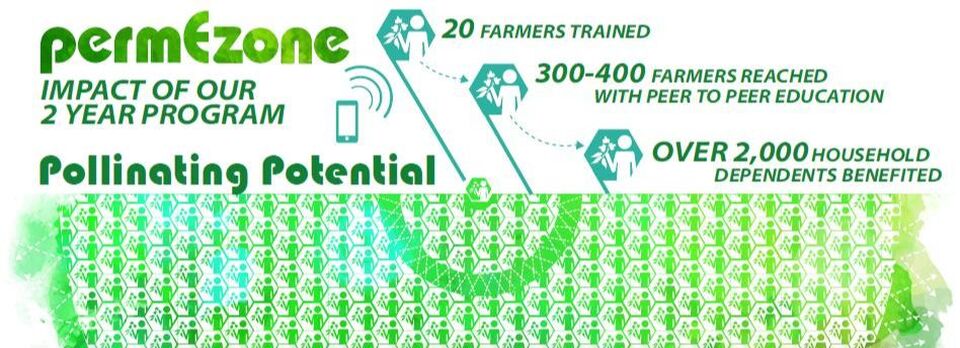permEzone is promoting the development of sustainable food systems by training farmers in permaculture techniques and empowering those farmers to work with other members of their community, forming new communities of practice around regenerative agriculture, and getting the support of local trainers in person and through our mobile phone platform.
The permEzone program started with these basic observations:
The permEzone program started with these basic observations:
- Farming lies at the heart of many of the world's most pressing social and environmental problems.
- Biodiverse farm systems designed using agro-ecological approaches offer sustainable improvements in yields and resilience.
- Development initiatives bring the most sustainable benefits when they grow out of the local community.
- We can work with the existing network of regional permaculture training centers to help rural communities build their own efficient, sustainable and ecologically regenerative food systems.
- Cellphones are an effective tool to share information in isolated rural areas and can be a great asset in reaching resource-poor communities.
This is how we multiply the impact of each phase of our pilot program...
WHY HELP?
This multi-year pilot is our chance to turn theory into practice. Selected training centers in East Africa, already working with local farming communities, are contributing their experience of training and support that is adapted to the needs of local conditions and cultures.
An independent team of academics and development professionals is monitoring, evaluating and reporting on the program's impact. Feedback from the trainers, the farmers and their support workers is informing the continuous development of the program, and the creation of a knowledge-base and support-base for a continuing expansion of the program.
We have now completed the first two phase of the pilot (in Kenya, are well along with Phase 2 and Uganda), and initiated Phase 3 back in Kenya in August 2020.
Each phase has a potential impact that more than justifies its cost:
José Graziano da Silva, Director-General of the UN’s Food and Agriculture Organization, described family farmers as the guardians of the world’s agro-biodiversity and of a large part of the natural resources – soils, water, forests, fish stocks – that will be needed by future generations for their survival. In fact, they embody the paradigm of sustainable agricultural development that we need to produce food and preserve the environment.
Learn more about the Pilot Program HERE.
An independent team of academics and development professionals is monitoring, evaluating and reporting on the program's impact. Feedback from the trainers, the farmers and their support workers is informing the continuous development of the program, and the creation of a knowledge-base and support-base for a continuing expansion of the program.
We have now completed the first two phase of the pilot (in Kenya, are well along with Phase 2 and Uganda), and initiated Phase 3 back in Kenya in August 2020.
Each phase has a potential impact that more than justifies its cost:
- 30 lead farmers representing their community, receive a permaculture design training, based on a curriculum that they have helped to create, over the initial 3-month period. They are then supported in creating 30 model farms, and sharing their knowledge and experience with other farmers in their community.
- 600 farmers will receive training by extension and peer-to peer education over the remainder of the 2-year project, and will help to trial a mobile phone platform to support extension work.
- 3000 household dependents will benefit from improved food security and cooperative practices that help build more resilient local economies.
José Graziano da Silva, Director-General of the UN’s Food and Agriculture Organization, described family farmers as the guardians of the world’s agro-biodiversity and of a large part of the natural resources – soils, water, forests, fish stocks – that will be needed by future generations for their survival. In fact, they embody the paradigm of sustainable agricultural development that we need to produce food and preserve the environment.
Learn more about the Pilot Program HERE.
PRI-Kenya
The Permaculture Research Institute, Kenya helped us to launch the pilot program in East Africa. They helped us design the program for the first phase of the pilot, and advised on which training centers we should work with in order to create a learning environment that is adapted to local conditions and cultures.
Their approach of extending the training program over several months, so that a seasonally-appropriate curriculum can be interspersed with practical experimentation, fits perfectly with the permEzone approach of creating long-term support systems to maintain the momentum of change after the training is over.
Their approach of extending the training program over several months, so that a seasonally-appropriate curriculum can be interspersed with practical experimentation, fits perfectly with the permEzone approach of creating long-term support systems to maintain the momentum of change after the training is over.



